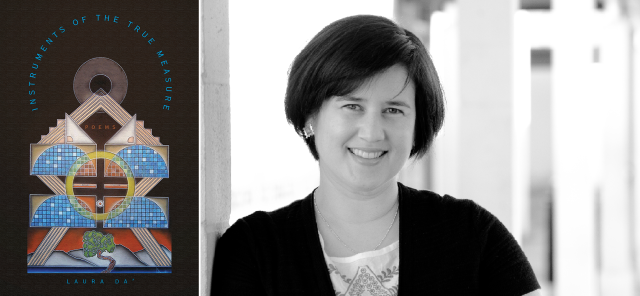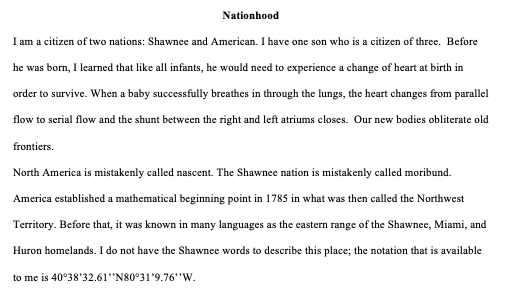“The book itself came from a place of terror, fear, gratitude, and a strong desire to survive.”

Instruments of the True Measure (University of Arizona Press, Suntracks Series, 2018)
Could you tell us a bit about your growing up and your path to becoming a writer?
I started writing poetry as a student at the Institute of American Indian Arts. Coming into my voice and vision in an inclusive, indigenous space has informed my writing life and given me the support and inspiration to continue.
How do you decorate or arrange your writing space?
I like writing in many different spaces. I live in a small home and don’t have any designated office or writing desk. I love to work in public libraries and other random quiet spaces. I am much more productive when there is a factor of novelty to my writing routine.
Could you share a representative poem from your book? Perhaps a poem that introduces the work of the book, or that invites the reader into the world of the book?
Yes, the following poem, “Nationhood,” opens this collection and introduces the major concepts of the book:

Why did you choose this poem?
I chose this poem because it juxtaposes loss and beginning, confounds tenants of identity and simplicity with challenging observations and questions, and presents an alternate possibility to both a physical grounding and a dominant narrative that is often seen as static.
What obsessions led you to write your book?
This book came from an obsession with American mapping and surveying and the way that measurement was a tool for colonialism and violence. It is also about the ways that the traumas of the past ripple into the present.
How did you decide on the arrangement and title of your book?
The poems in my book follow a narrative trajectory as they trace the lives of two symbolic figures through the American West, but that is interrupted by short, tight lyrical poems and longer prose poems that charge through linear time. I want the book to tell a story that honors the chaotic truth of multiple narratives.
Which poem in your book has the most meaningful back story? What’s the back-story?
Back-story is my king. All of the poems in the collection ride a number of different stories and turn one another into context, but I think the longer prose pieces like “Pain Scale Treaties” and “Parting Call” represent new territory for me in that they are rooted in my own personal back-story. I wrote about a third of this book on dialysis, waiting on the organ transplant list. I’m deeply grateful to be recovering from a transplant now, but the book itself came from a place of terror, fear, gratitude, and a strong desire to survive.
What has the editorial and production experience with your press been like? To what degree did you collaborate on the cover image and design of your book?
The University of Arizona Press published both of my books, and I can’t say enough about how collaborative and supportive they have been. Finding a compatible press is one of the luckiest things I have encountered in my writing life. I say lucky because there is so much pressure to publish that I believe poets often feel compelled to move through the process in a manner that is informed by scarcity and intensity instead of reflection. The production process for both my books was engaging and satisfying. The cover art is actually my husband Jarrod’s work (www.jarrodda.com).
What are some of your favorite books or chapbooks—perhaps some that have influenced you?
As I was writing this book, I was deeply influenced by James Thomas Stevens’ Tokinish, Jennifer Elise Foerster’s Leaving Tulsa, Tyehimba Jess’s Olio, and Arthur Sze’s Compass Rose. Books that explore the subtext of narrative and actively dismantle colonialism and racism inspire me because the research necessary for the historical elements of my poetry is often brutally painful.
If you could choose another artistic path (painting, music, etc.) what would it be and why?
I think I would be a very fine actor for some of the same reasons I am drawn to poetry. I have a simmering sense of drama and theatricality hidden under a deceptively mild façade.
What advice would you offer to students interested in creative writing?
I would encourage any writer to cultivate a community because writing is lonely. Friendships are the best thing I can earn from my writing. Additionally, I would warn new writers to be diplomatic and kind about how they conduct themselves, but shrewd about the motivations of others, particularly those in power. The writing community can shelter forms of abusive behavior designed to discourage or decenter new writers.
What do you wish you had been told as a writer? What wisdom have you arrived at?
I wish I had been encouraged to probe at the binary between the individual and the collective because I have found my greatest strengths in company and my greatest errors alone.
What question would you like to ask future writers featured at Speaking of Marvels?
What do you wish writers did for each other to support a healthy writing community? I would ask future writers what elements of the writing life they find harmful/dangerous/demoralizing and how the community can address them.
*
Laura Da’ is a poet and teacher. She is Eastern Shawnee. Her first book, Tributaries, won a 2016 American Book Award. Da’ lives near Seattle with her husband and son. Her newest book is Instruments of the True Measure.